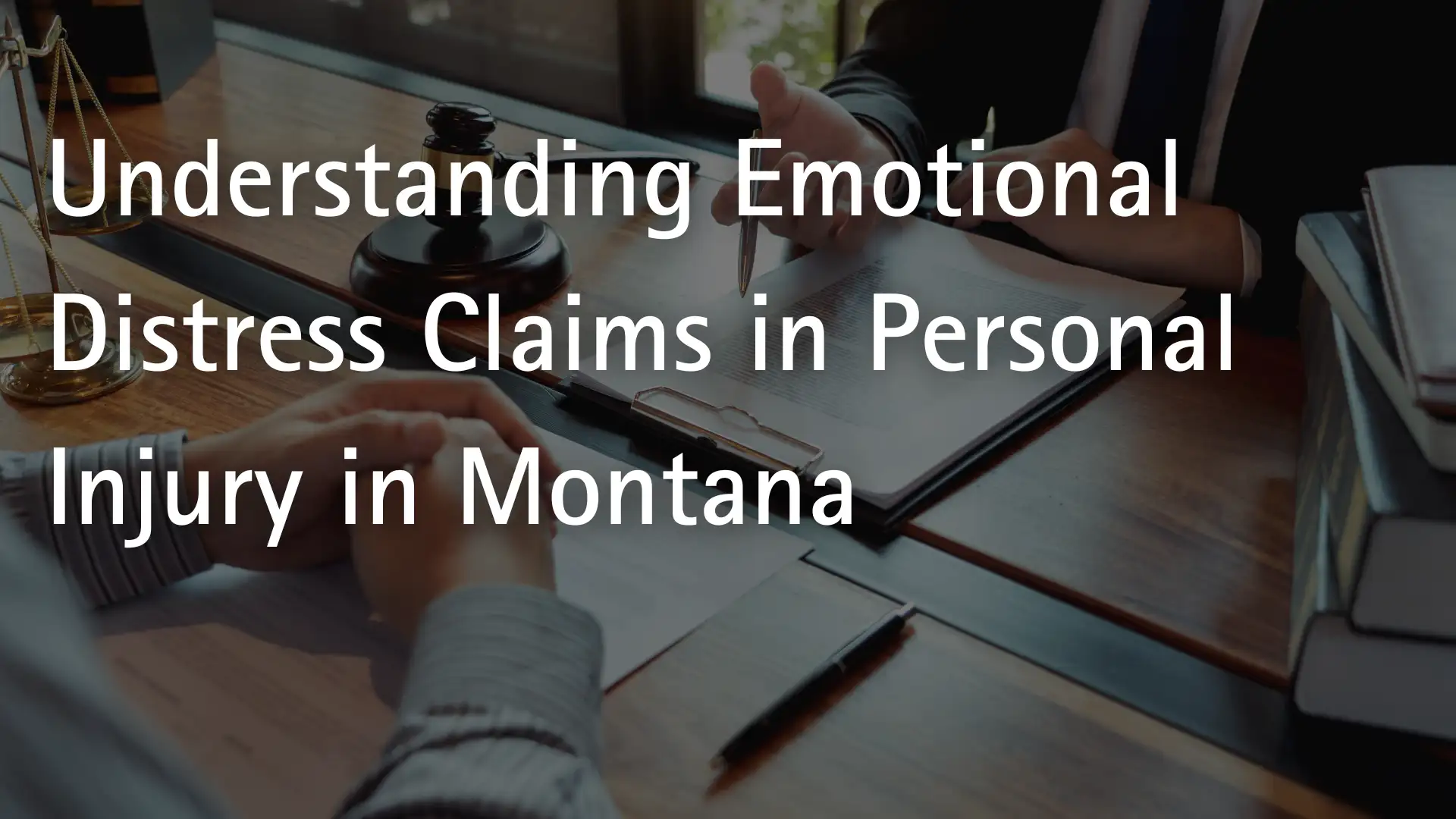
When a serious accident leaves you with more than just physical injuries, the emotional and psychological aftermath of your incident can be just as devastating to your daily life and overall well-being as the physical one. The good news: Montana law allows victims to claim compensation for mental anguish, anxiety, depression, and other psychological trauma that often follows a life-changing incident—something that may be addressed through emotional distress claims in common personal injury cases.
What Is Emotional Distress in a Personal Injury Case?
Montana courts recognize both physical and emotional injuries as compensable harms. The latter, sometimes called “emotional distress,” refers to the psychological and mental suffering that victims experience following an accident or injury caused by someone else’s negligence. This harm often extends beyond physical pain to include a wide range of mental and emotional reactions, such as anxiety, depression, and loss of enjoyment of life, raising an important question: Does personal injury include emotional distress?
Emotional distress can also go by the names “mental suffering,” “mental anguish,” or “psychological trauma.” In severe cases, accident victims can develop PTSD, which can include symptoms like intrusive memories, avoidance behaviors, negative changes in thinking and mood, and changes in physical and emotional reactions.
When Can You Claim Emotional Distress Damages?
Montana law allows victims to pursue compensation for emotional distress, but they must meet specific requirements for a valid claim.
Proving the Connection
To recover compensation for emotional distress, you will likely need to prove the following:
- The party that caused your accident acted negligently.
- The accident or incident caused your emotional distress.
- You experienced severe emotional distress.
In order to prove the severity of your emotional distress, you may need some of the following evidence:
- Medical expert testimony and psychological evaluations
- Documentation of treatment from psychiatrists, psychologists, or counselors
- Testimony from family members and eyewitnesses about behavioral changes
- A pain journal documenting daily impacts and medical appointments
Intentional vs. Negligent Infliction
Montana recognizes both negligent and intentional infliction of emotional distress as separate causes of action. If you claim that the at-fault party intentionally inflicted emotional distress on you, you need to prove that the emotional distress was a reasonably foreseeable consequence of the defendant’s intentional act or omission.
How Emotional Distress Affects Compensation
If you experience emotional distress after your accident, the court may adjust the total compensation you receive in your personal injury case upward to include that distress. The severity and duration of your emotional harm, the impact of the distress on your daily life, and the steps you take after your accident can all affect the total amount that you see in your case.
Damage Caps and Limitations
Montana does not cap compensation for personal injury claims, except in medical malpractice cases. In those cases, the court caps non-economic damages (including emotional distress, pain and suffering, and loss of enjoyment of life) at $250,000.
What Is the Statute of Limitations for Emotional Distress and Personal Injury Claims in Montana?
If you need to consider an emotional distress or personal injury claim in Montana, you must pay attention to the statute of limitations. This law sets the legal deadline for filing a lawsuit, which can permanently bar your right to seek compensation.
General Rule: Three Years to File
For most personal injury claims settlement in Montana—including those involving emotional distress after a car accident or other traumatic event—you have three years from the date of the injury to file a lawsuit in court. This time frame applies to cases based on negligence, such as car accidents, slip-and-fall incidents, or other situations where another party’s actions caused your harm.
Discovery Rule Exception
If you did not immediately discover your injury, Montana’s “discovery rule” may come into play. This rule delays the statute of limitations’ clock to the date when you found, or reasonably should have discovered, your injury.
Special Rules for Claims Against Government Entities
You must follow special notice and filing procedures if your injury claim involves a government vehicle or employee. Generally, you must present your claim in writing to the appropriate government agency before filing a lawsuit.
Shorter Deadlines for Certain Claims
Some types of legal claims have shorter statutes of limitations. For example, victims of defamation, slander, assault, battery, or false imprisonment must file within two years of the incident.
Get Help with Emotional Distress Claims in Personal Injury at Travis & Brann, PLLP
At Travis & Brann, PLLP, our experienced personal injury attorneys in Kalispell understand the emotional toll that accidents can have on victims’ lives. Our team is here to help you understand your rights and take the first step toward securing the necessary benefits.
We work diligently to help our clients receive the compensation they deserve. Contact us now to have a free consultation.
Related Post
How to Handle Personal Injury Claims for the Elderly in Montana

